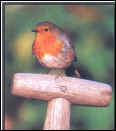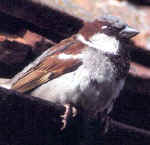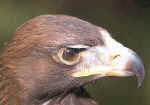| BIRDWATCH IN COOKHAM |

December 2000
Well,
the floods are effecting us all, and they are affecting the birds
too. Those  which
depend on foraging in fields and hedgerows, such as Lapwing, Woodpigeon,
Partridges,
Dunnocks
and Blackbirds, are really
struggling at present and many will have foresaken Cookham for a
while to find drier feeding.
which
depend on foraging in fields and hedgerows, such as Lapwing, Woodpigeon,
Partridges,
Dunnocks
and Blackbirds, are really
struggling at present and many will have foresaken Cookham for a
while to find drier feeding.
Owls and Kestrels too will be having real difficulties, with many voles drowned or relocated. Only time will tell the real toll.
However, it has had the affect of drawing in other species, and there have been huge numbers of gulls around this last week or two. At present, there are typically 2,500 Black-headed Gulls on Widbrook Common. Of course, it is out of the breeding season so most will not in fact have black heads, just a black smudge behind the eye. Other species such as Herring Gull and Lesser Black-backed Gull are to be seen as well.
But probably the most exciting has been the arrival of a small party of Bewicks Swans, all the way from Russia, and making use of huge expanses of water outside the traditional wintering areas in the UK.
Two adults and four immatures arrived in Widbrook around lunch-time today (18th December) and if the water level stays high and they are not disturbed, they could well hang around for a while.
They can be discerned from the Mute Swans by their black and yellow bills and the lack of a knob on top of the bill. They will probably stick together so look for a group of six, 2 white and 4 brownish ones. But you will need binoculars for successful observation.
Today they were on the west side of the road, looking towards Cookham Rise. Good hunting.
27 September 2000
I wonder how many readers may have been wondering why so many people have been on Winter Hill lately looking up to the skies? No, they were'nt observing spiralling fuel prices! They were looking for Buzzards.
And not just any Buzzards. The UK receives about 20 pairs of Honey Buzzards from Africa each year and they spread themselves throughout the UK, breeding in about three locations only. And so they are a rare bird to find.
So imagine the surprise in birding circles when news started getting out that dozens were being seen in the north-east of the country, gradually moving south.
A check of the weather pattern suggested that huge numbers of Scandanavian Honey Buzzards were being blown across the north sea and using our eastern coast to travel south along, instead of the west of scanwegia etc.
Well, over the next three days, some 300 to 400 of them streamed down the UK and many got as far inland as Berkshire.
In the past thirty years there have only been 13 individuals reported in the County. Over the last few days, almost twice this number have been spotted passing overhead, a good number over the Cookhams.
Ornithological history was being made right over our heads, and even on Monday 25th, no less than 9 went over.
So next time you see someone looking straight up, ask them 'Are you looking for Buzzards, Honey?'
|
September 2000 "Well, after yet another wet spell, here we are in the second week of September experiencing some of the highest temperatures yet this summer. And if that confuses us, what does it do to the birds. House martins in the Cookham's not only arrived late, but delayed breeding due to the very wet start to the season. In fact,most left it too late to start a second brood, so that does not bode well for numbers next year.
Of course, we are now in the main migration window for many species. Swifts had already left the Cookhams by end July, and Whinchats were moving through Strande Water by end August. Hobbies have had a good year and I saw 3 over Widbrooke, 7 over Winter Hill Golf Course, and 3 more over Bourne End this Sunday. They look so majestic chasing dragonflies and flying ants, often in the midst of much more ungainly gulls trying to do the same thing! Slightly further afield, a Hoopoe has taken a fancy to a paddock in Twyford and has staked a claim to it for three weeks now. Swallows are on the move and warblers are slowly disappearing. However, Skylarks should soon be back with us having spent the end of their breeding season on the coast to moult. Why not let us know of any unusual sightings in the Cookhams, or whilst you were on holiday."
|
|
June
2000
|
Tawny Owls will have fled their cavity nests a few weeks ago.
Did you happen to see us on TV a couple of Sundays ago?
Country File covered the inspection of the Tawny Owl boxes
that we installed in Quarry Woods during the winter, and several
Cookham birders were involved with the Hawk & Owl Trust, and the
Woodland Trust, checking which ones may have been used. We did
find evidence of at least one having been used to raise owlets, but
several were empty, quite a few had been taken over by squirrels,
and two had been stuffed full of material by Great Tits
(which must have taken ages!). The most interesting one
however, and fortunately captured on the camera, was a
quickly-departing Mandarin Duck, leaving a bemused Roger
Parkes to look inside and find no less than 16 Mandarin eggs!
These chicks will eventually have to leap down onto the ground and
be quickly led to the nearest part of the Thames - which must be
hundreds of yards away!
Many of you may have seen the regular sorties of Red Kite over the village this summer. A most welcome sight. And not too far away, at Bray Gravel Pit, a much rarer Red-footed Falcon lingered for a short while. Meanwhile, I am doing a sponsored 24-hour bird race in support of the Cookham Millennium Pageant fund, so if you would like to sponsor me, do get in touch.
|
March 2000 March seems to have crept up on us somewhat but it is an exciting month from an avian point of view with the first migrants appearing. Already, Swallow, Sand Martin and House Martins have been spotted on the south coast.
Again, I would be grateful to hear from anyone who has them in their garden regularly. After all, at the present rate of national decline, you might not for much longer!
|
|
February 2000 Well,
It's February and in our crazy 'global warmed' world, the
birds are totally confused. Our local Broomhill Song
Thrush has been singing his heart out all January and
February, and so has the one in Alleyns Lane. Have you
got one near you? Blackcaps
have been wintering
in several Cookham gardens; these are not the same birds as
those spending the summer with us, but ones who have come
from Germany, having worked out it's quicker to get back
there from UK than from Africa. And who said animals
were dumb!!
|
|
January 2000
Well,
we are into AD2000 and we should see soon how many of the Little
Owl boxes get used. In the meantime, we have not
been idle and have been working with the Hawk & Owl
Trust, and the Woodland Trust, to install 20 Tawny Owl
|
|
 Lots
of tits and thrush species lost out to the
rainy spring spell also. 'Our garden
Lots
of tits and thrush species lost out to the
rainy spring spell also. 'Our garden  Robins
tend to feed more on ground pests whilst Tits go more
for caterpillars and insects in trees and bushes, which were
perhaps fewer in number. Also, the rain water taken
into boxes on birds feathers has far less opportunity to dry
out than in open nests such as robins etc causing rapid
cooling of the chicks. Global warming is not having
entirely beneficial effects on garden birds after all!
Robins
tend to feed more on ground pests whilst Tits go more
for caterpillars and insects in trees and bushes, which were
perhaps fewer in number. Also, the rain water taken
into boxes on birds feathers has far less opportunity to dry
out than in open nests such as robins etc causing rapid
cooling of the chicks. Global warming is not having
entirely beneficial effects on garden birds after all!  You
may have had one of Germany's
You
may have had one of Germany's  From the 'raptor watchpoint' on Winter Hill yesterday, there
was a group of 4
From the 'raptor watchpoint' on Winter Hill yesterday, there
was a group of 4  boxes
in Quarry Wood and Bisham Woods.
boxes
in Quarry Wood and Bisham Woods.